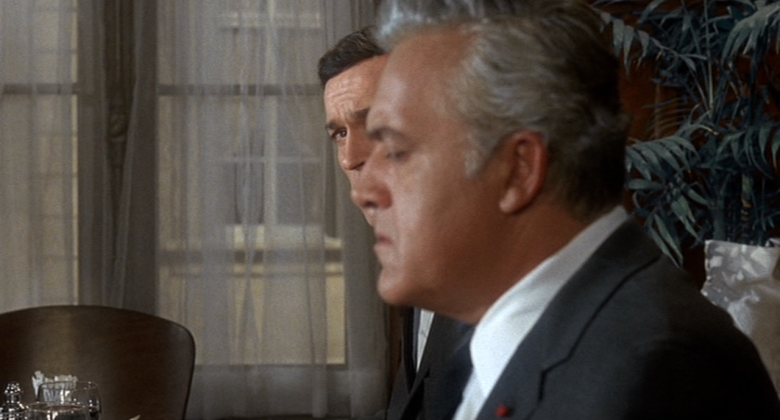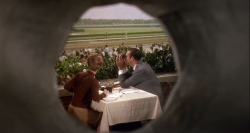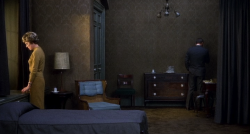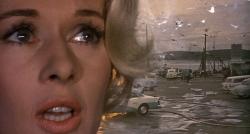Reviews
Alfred Hitchcock
USA, 1969
Credits
Review by Rumsey Taylor
Posted on 16 December 2011
Source Universal Studios DVD
Categories Late Hitchcock
Topaz is set in four discrete locations at the time of the Cuban Missile Crisis in 1962, and features characters from each of them: CIA agents in Washington, D.C; French agents in Paris; a revolutionary in Cuba; and a KGB agent who defects in Copenhagen. As the film volleys back-and-forth from one place to another the plot becomes further unsnarled, and the characters’ loyalty clearer shades of black and white. It is, like North by Northwest, a globetrotter film rife with espionage, but whereas such variety in setting was integral in the 1959 film, in which natural and architectural icons elevate the film’s roller coaster suspense, in Topaz it is foremost intent to orient the action in an authentic history—a history ballasted with the elements of an old-fashioned spy plot.
For measure: a Cuban political rally midway through the film is propagandized by authentic documentary footage of Fidel Castro speaking to a crowd of intent listeners—Che Guevera, even, is visible in the periphery. Shortly after this sequence, a French spy - who’s in Cuba to gather information on the Russians’ activity there - expositorily introduces the gadgets he has smuggled in for his informant to use. He does this with the practiced showmanship that would characterize an identical scene in a James Bond film.
Topaz is absent a primary authoritative presence to whom one’s sympathy or suspicion may be placed, and it is almost totally devoid of comedy. A vastly more knotted and international film than those that it bookends with North by Northwest, it is additionally Hitchcock’s longest film, yet it is also markedly less flamboyant than any of them. Accordingly, it opens without any dialogue for many minutes, with a KGB agent and his wife and daughter as they maneuver toward a public safe house at which they’re to be rescued by CIA agents in Copenhagen—he is defecting from the Russian spy organization, and on an otherwise colorful day finds the city full of other KGB agents who intend to collect - if not kill - him and his family.
This opening is predominantly silent, and is among the film’s standout sequences. The KGB agent is subsequently relocated to D.C. at which he relays his knowledge of the Russians’ activities in France and Cuba, and henceforth the visceral suspense of the opening scene is foregone in favor of characters’ descriptions of suspense. The ensuing portion of the film is told sternly in dialogue, all of it emanating from characters that relay little emotion beyond suspicion or determination.
The most suspicious and determined would be Albert, the aforementioned French spy and advisor to the CIA. The KGB agent foretells of a corrupt faction of Russian spies who’ve ascended the ranks of the French government, entitled “Topaz.” Albert is dismayed by this claim, a response punctuated in a pair of tightened lips and two drawbridge eyebrows that will remain erect for the remainder of the film. Albert thus becomes the viewer’s proxy for investigation, and the action follows him to New York, in which a Cuban leader with ties to the Russians is staying, and Cuba, where he enlists his mistress to report on the Russians’ activity there.
In his responsibility to render the otherwise fatalistic circumstances compelling for the purposes of entertainment, Albert amounts to Topaz’s single primary character. As his suspicions are paramount, absent in him is the charisma or wit that so reliably describes the leading men in Hitchcock’s other films. For this matter, the remaining characters are generally uncharismatic as well, and each of them inherit Albert’s narrow emotional spectrum. The greatest exception is Rico, the Cuban leader, who opposes Albert not only politically but characteristically: he is compellingly secretive yet outward and commanding (he is always dressed in military fatigues). He is passionate in his desires in a way that Albert is not. More particularly, Rico is characterized by his political affiliation, and Albert by his lack of affiliation, having been deceived by Russian agents in France and commanded by those in the U.S.
Albert would seem the more honorable character in this comparison, but he is also deceptive. His visit to Cuba has a dual purpose: his liaison, a respected widow to a former revolution leader, is also his mistress. His wife suspects his infidelity, a claim he curtly denies, and later we learn of her own indiscretions with one of Albert’s colleagues, who is furthermore Topaz’s central authority. None of these characters is ultimately honorable, and the film presents a world in which deception is the greatest currency in obtaining truth. This claim is problematic, however, because you never get the sense that these characters are deceptive precisely in order to uncover the truth. Rather, they deceive - like Albert to his wife, and on a greater scale Rico to U.S. - for the purpose of their own satisfaction.
There is no possibility for absolute redemption at the end because the film’s idea of corruption is so far-reaching. To expose Topaz Albert must consider his own defection—the KGB agent, seen at the beginning, recommends this option to him personally, citing all the freedom the U.S. has granted him in exchange for political intelligence. And in Albert’s endeavor to do so, he endangers both his son-in-law and his mistress. His moral right notwithstanding, Albert - who by default amounts to the most honorable character - is ultimately more dangerous than those he opposes; at least, his actions precipitate all the bloodshed in the film.
Topaz concludes in a manner that resolves the central conflict, but this conclusion is met with some ambivalence. Albert has survived, and he’s seen - having delivered his knowledge of Topaz to his bosses in Paris - with his family aboard a flight to the U.S.—for once, smiling. The final shot finds another propagandistic headline, “CUBAN MISSILE CRISIS OVER,” but this image accompanies no celebration.
The Endings
In its original form Topaz was greeted with skeptical audiences in test screenings. The most outward difference in this version of the film was the ending, in which Albert rather cartoonishly faces the leader of Topaz in a formal duel at a football stadium. This ending effectively depletes the seriousness that describes all that precedes it. It was intelligently replaced by an action that’s now considered the formal ending, in which Albert exposes Topaz and witnesses the faction’s leader escaping on an outbound flight in Paris. A third, entirely contrived ending culminates in Topaz’s leader’s suicide, and is manufactured in recycled footage and foley sound.
I’m unfamiliar with what sort of resistance Hitchcock encountered in his other films, but these endings deviate so greatly from one to the other that I question Hitchcock’s interest in the material. He has stated that the ending that’s now associated with the popularly comprehended cut of the film is his preference, and by some measure the alternate endings may example his interest in experimentation. But knowledge of these endings reinforces the ambivalence that permeates Topaz. It is a technically accomplished film, and its narrative is robust and complex, even if its destination is ultimately of no great significance.
More Late Hitchcock
We don’t do comments anymore, but you may contact us here or find us on Twitter or Facebook.









